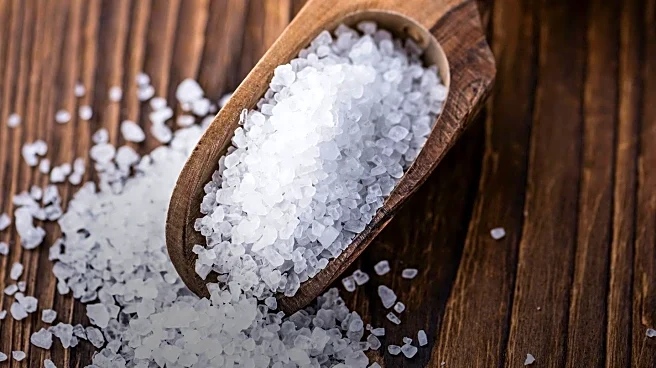What is the story about?
What's Happening?
Chefs across the United States are advocating for the use of Diamond Crystal Kosher Salt as the preferred choice in cooking. According to Daniel Tse, head chef at Wander the Resort, Diamond Crystal Kosher Salt is distinguished by its larger, lighter grains, which deliver less sodium per pinch compared to other brands. This characteristic makes it a staple in American kitchens, particularly for its ability to dissolve quickly and distribute seasoning evenly. Kirstyn Bielawa, executive chef at Ironwood Kitchen & Cocktails, echoes this sentiment, highlighting its less salty taste and crumbly texture, which enhances the seasoning of various dishes. Additionally, Maldon Flaky Sea Salt is recommended for finishing dishes due to its delicate crunch and burst of flavor. Smoked sea salt is also favored for adding depth without overpowering the dish, especially when grilling.
Why It's Important?
The preference for Diamond Crystal Kosher Salt among chefs underscores its significance in culinary practices, impacting how dishes are seasoned and perceived by consumers. Its unique grain size and consistency offer a more controlled and balanced seasoning, which is crucial for achieving desired flavors in cooking. This choice reflects broader trends in the culinary industry, where chefs prioritize quality and consistency in ingredients to enhance the dining experience. The endorsement of specific salts by professional chefs can influence consumer purchasing decisions, potentially leading to increased demand for these products. As chefs continue to share their preferences, it may also drive innovation and competition among salt producers to meet the evolving needs of the culinary market.
What's Next?
As chefs continue to advocate for specific types of salt, consumers may increasingly seek out these recommended products, potentially leading to shifts in market demand. Salt producers might respond by highlighting the unique qualities of their products or developing new offerings to cater to the preferences of culinary professionals. Additionally, restaurants and food establishments may adjust their ingredient sourcing to align with these recommendations, aiming to enhance the quality of their dishes. This trend could also inspire home cooks to experiment with different salts, broadening their culinary repertoire and improving their cooking techniques.
Beyond the Headlines
The emphasis on specific salts by chefs highlights the importance of ingredient quality in culinary arts, which can have broader implications for food culture and consumer habits. As chefs prioritize certain salts for their unique properties, it may encourage a deeper appreciation for the nuances of seasoning and the role it plays in flavor development. This focus on quality ingredients aligns with a growing movement towards mindful and informed cooking practices, where consumers are more aware of the impact of their choices on taste and health. The discussion around salt preferences also opens up conversations about sustainability and ethical sourcing, as consumers become more conscious of the origins and production methods of their food.

















